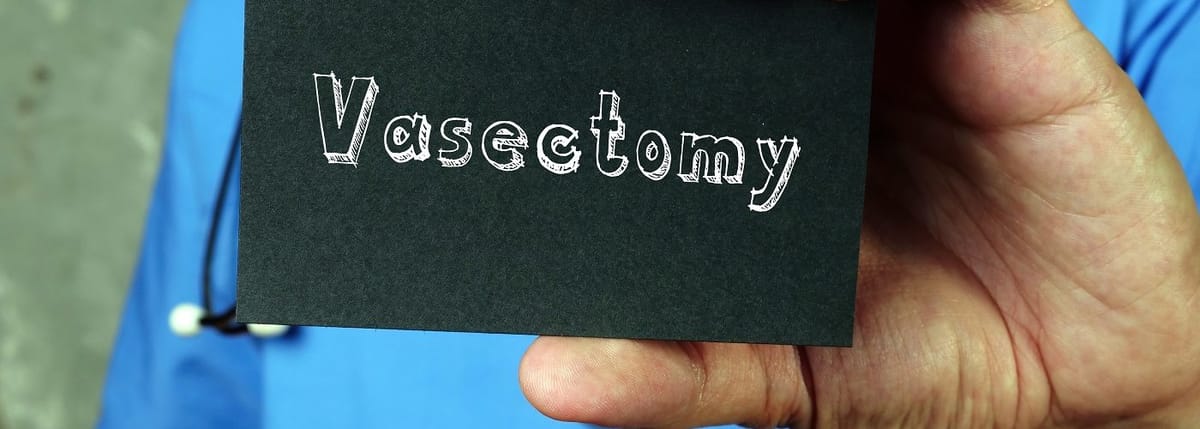
Vasectomy is intended to be a permanent form of contraception for men who either do not want to father a child or who have completed their families. However, an unexpected change in circumstances can always happen, possibly bringing with it a change of heart and the decision to try for a vasectomy reversal. If you, your partner or a loved one finds themselves in this situation, you’ll need to know the key facts:
- Can vasectomy be reversed?
- How successful are vasectomy reversals?
- How long does it take to recover?
- What if a vasectomy reversal fails?
We aim to explore these issues as well as any risks and benefits, to help you make a well-informed decision about your future fertility. We also have some options for alternatives to vasectomy reversal that you may like to consider.
Can vasectomy be reversed?
If you’ve had a vasectomy, you’ll know that it’s a simple operation in which the vas deferens, which are the tubes carrying sperm from your testicles to your penis, are severed. Your body still produces sperm, but there are none in your ejaculate.
A vasectomy can be reversed, but this is a much more serious operation. Reconnecting the tubes is a more complicated job than simply cutting them and often requires the use of microsurgery, using a powerful microscope to magnify the tubes. The operation is usually carried out under general anaesthetic and lasts from two and a half to four hours. During the operation, the doctor makes a small incision of about 2 cm on each side of your scrotum. The two vas deference tubes are cut on either side of the site of the original seal or tie and gently opened up to see whether there are any sperm inside. Depending on the result of this investigation, the doctor will proceed in one of two ways:
- If sperm are present in the fluid, there is no blockage in the tubes themselves and they can be joined together again.
- If there are no sperm in the tubes, this indicates that the tubes are blocked and re-joining them would serve no purpose. In this case, the surgeon would join the vas deferens directly to the epididymis at the back of each testicle. This is where sperm are stored. This is a more difficult procedure and would normally only be carried out where the simpler re-joining of the tubes would not be successful.
Until the operation is under way, the surgeon has no way of knowing which of these two procedures will be needed.
How successful are vasectomy reversals?
Although there are no guarantees, the success of the operation depends to a large extent on three major factors.
- The length of time it has been since the original vasectomy was performed. For example, if it was not more than three years ago, there is approximately a 75% chance that the reversal with be successful. If your original operation was 15 years ago, the chance of successful reversal reduces to around 30%.
- The exact nature of the vasectomy. There are different ways of preventing the vas deferens from conveying sperm, such as sealing, cauterising or cutting. This has an impact on how much of the tubes are left for the surgeon to work with.
- A final important factor is the skill and experience of the surgeon who performs your operation.
As for knowing whether the operation has been a success, you may need to wait some time. Around three months after the operation, your semen will be tested for the presence of sperm. If you’ve had the more complicated operation to join the vas deferens directly to the epididymis, it can take even longer before the sperm supply is recovered. You may need to repeat the tests at three-monthly intervals for up to a year before they detect sperm.
A small word of warning here: even if your operation is successful in the sense that sperm in your ejaculate is restored, there is no guarantee that you will successfully make your partner pregnant. This depends on several other factors, such as the quality of your sperm and your partner’s age and fertility status.
Recovery from a vasectomy reversal
After the operation, you will probably have some bruising and discomfort for a few days, and you’ll need to wear a tight-fitting garment such as an athletic support. Your doctor will probably give you advice to take it easy, specifically:
- For the first couple of days after the operation, keep the site of the surgery dry, so no swimming or even showering.
- Continue with the athletic support for a few weeks except while showering. You may need to wear one even after the first few weeks when exercising or engaging in heavy work. In any case, strenuous activities like jogging, heavy lifting, cycling and all kinds of sports should be very limited for about six to eight weeks after the surgery.
- Avoid sexual intercourse or ejaculation until the doctor gives you the go-ahead, normally after two or three weeks.
What can I do if vasectomy reversal fails?
We’ve seen that, even with a vasectomy, your body continues to produce sperm. In the event that your operation is not successful, you still have the option to try for a baby, using a technique associated with the IVF process. This is known as intracytoplasmic sperm injection (ICSI). This is how it works:
- The IVF treatment starts in the normal way with hormonal stimulation for the woman so that her ovaries produce multiple oocytes.
- At the appropriate time, you undergo a testicular biopsy, a simple outpatient procedure which takes about 15 to 20 minutes.
- Your sperm are extracted from the biopsy and prepared in the laboratory so that embryologists can select the healthiest.
- Because there are relatively few sperm when they are extracted in this way, they are not suitable for the normal IVF method of mixing with the oocytes to encourage fertilisation.
- Instead, a single sperm is selected and microinjected into each oocyte to create the optimum chance of fertilisation.
- When the resulting embryos have been cultured in the laboratory for around five to six days, a single healthy embryo is selected for transfer to the uterus.
- Any remaining good quality embryos can be frozen for future IVF cycles, if desired.
Contact us at IVI
If you’re thinking of having a vasectomy reversal, let’s hope it’s successful. Don’t forget that even if it isn’t, you don’t need to give up hope of becoming a father. If you and your partner would like to talk to us about your options, don’t hesitate to get in touch.





Comments are closed here.